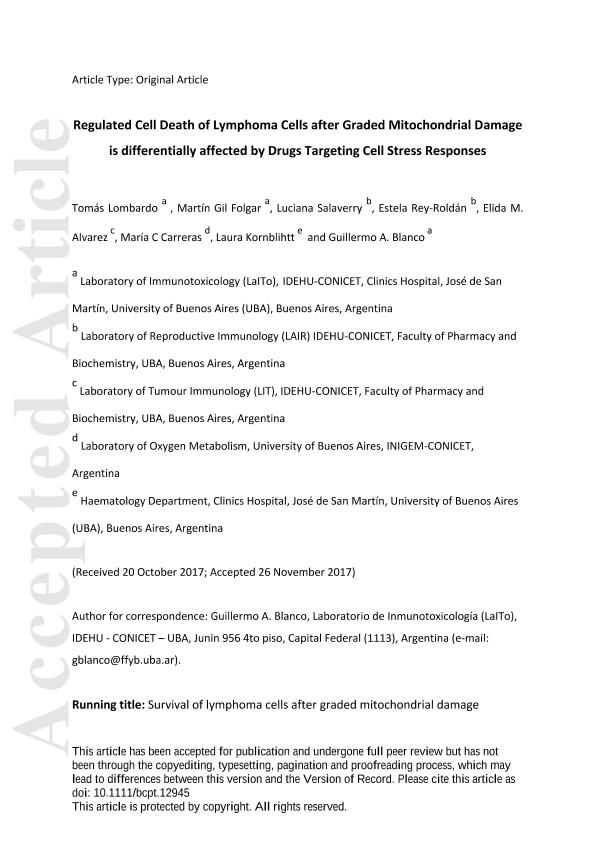Artículo
Regulated Cell Death of Lymphoma Cells after Graded Mitochondrial Damage is Differentially Affected by Drugs Targeting Cell Stress Responses
Lombardo, Tomás ; Gil Folgar, Martín; Salaverry, Luciana Soledad; Rey, Estela Beatriz
; Gil Folgar, Martín; Salaverry, Luciana Soledad; Rey, Estela Beatriz ; Alvarez Carbonetto, Elida M. del C.
; Alvarez Carbonetto, Elida M. del C. ; Carreras, Maria Cecilia
; Carreras, Maria Cecilia ; Kornblihtt, Laura Inés; Blanco, Guillermo Armando C.
; Kornblihtt, Laura Inés; Blanco, Guillermo Armando C.
 ; Gil Folgar, Martín; Salaverry, Luciana Soledad; Rey, Estela Beatriz
; Gil Folgar, Martín; Salaverry, Luciana Soledad; Rey, Estela Beatriz ; Alvarez Carbonetto, Elida M. del C.
; Alvarez Carbonetto, Elida M. del C. ; Carreras, Maria Cecilia
; Carreras, Maria Cecilia ; Kornblihtt, Laura Inés; Blanco, Guillermo Armando C.
; Kornblihtt, Laura Inés; Blanco, Guillermo Armando C.
Fecha de publicación:
05/2018
Editorial:
Wiley Blackwell Publishing, Inc
Revista:
Basic & Clinical Pharmacology & Toxicology
ISSN:
1742-7835
Idioma:
Inglés
Tipo de recurso:
Artículo publicado
Clasificación temática:
Resumen
Collapse of the mitochondrial membrane potential (MMP) is often considered the initiation of regulated cell death (RCD). Carbonyl cyanide 3-chlorophenylhydrazone (CCCP) is an uncoupler of the electron transport chain (ETC) that facilitates the translocation of protons into the mitochondrial matrix leading to the collapse of the MMP. Several cell stress responses such as mitophagy, mitochondrial biogenesis and the ubiquitin proteasome system, may differentially contribute to restrain the initiation of RCD depending on the extent of mitochondrial damage. We induced graded mitochondrial damage after collapse of MMP with the mitochondrial uncoupler CCCP in Burkitt?s lymphoma cells, and we evaluated the effect of several drugs targeting cell stress responses over RCD at 72 hr, using a multiparametric flow cytometry approach. CCCP caused collapse of MMP after 30 min., massive mitochondrial fission, oxidative stress and increased mitophagy within the 5-15 μM low-dose range (LDR) of CCCP. Within the 20-50 μM high-dose range (HDR), CCCP caused lysosomal destabilization and rupture, thus precluding mitophagy and autophagy. Cell death after 72 hr was below 20%, with increased mitochondrial mass (MM). The inhibitors of mitophagy Mdivi-1 and vincristine increased cell death from CCCP within the LDR, while valproic acid (an inducer of mitochondrial biogenesis) also increased MM and cell death within the LDR. The proteasome inhibitor, MG132, increased cell death only in the HDR. Doxycycline, an antibiotic that disrupts mitochondrial biogenesis, had no effect on cell survival, while iodoacetamide, an inhibitor of glycolysis, increased cell death at the HDR. We conclude that mitophagy influenced RCD of lymphoma cells after MMP collapse by CCCP only within the LDR, while proteasome activity and glycolysis contributed to survival in the HDR under extensive mitochondria and lysosome damage.
Palabras clave:
Mitophagy
,
Mitochondrial Fission
,
Mdivi1-1
,
Lysosomes
Archivos asociados
Licencia
Identificadores
Colecciones
Articulos(IDEHU)
Articulos de INST.DE EST.DE LA INMUNIDAD HUMORAL PROF.R.A.MARGNI
Articulos de INST.DE EST.DE LA INMUNIDAD HUMORAL PROF.R.A.MARGNI
Citación
Lombardo, Tomás; Gil Folgar, Martín; Salaverry, Luciana Soledad; Rey, Estela Beatriz; Alvarez Carbonetto, Elida M. del C.; et al.; Regulated Cell Death of Lymphoma Cells after Graded Mitochondrial Damage is Differentially Affected by Drugs Targeting Cell Stress Responses; Wiley Blackwell Publishing, Inc; Basic & Clinical Pharmacology & Toxicology; 122; 5; 5-2018; 489-500
Compartir
Altmétricas



